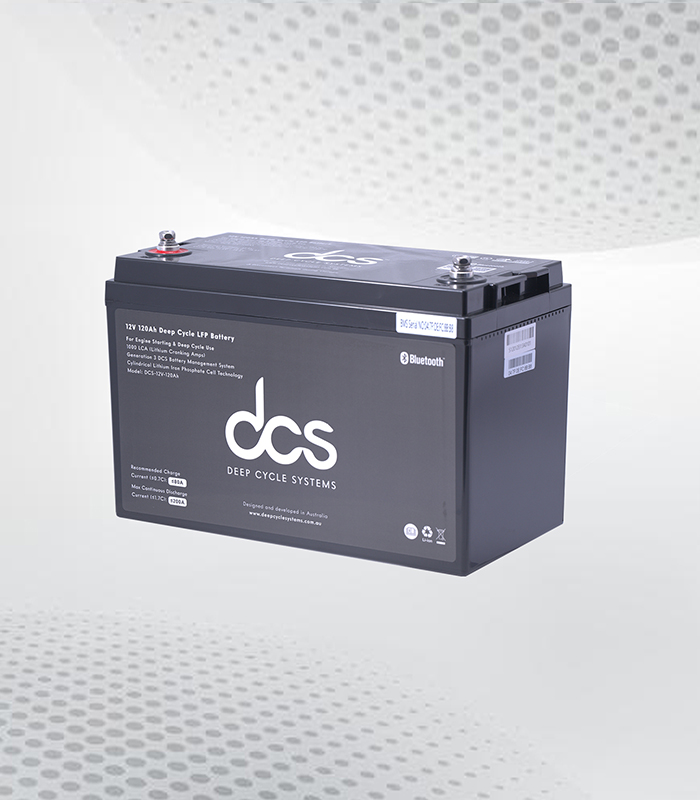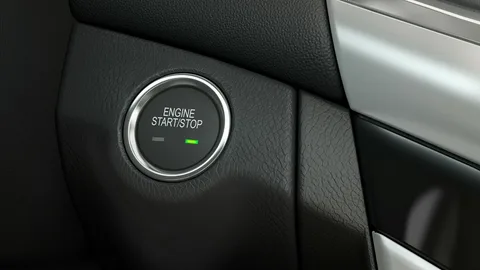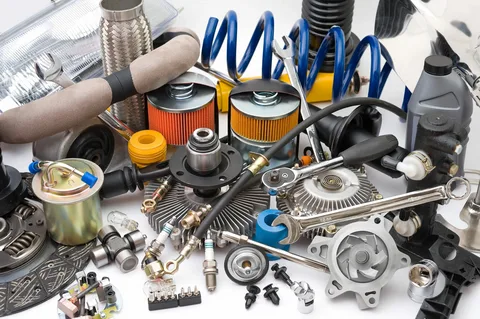Regarding reliable power storage for various applications, a 120ah Deep Cycle battery is a popular choice. These batteries are designed to provide a steady and consistent power flow over an extended period, making them ideal for marine, RV, solar, and other off-grid applications. This blog post will explore the Science behind 120-ah Deep Cycle batteries, their applications, tip for maximising their lifespan, choosing the right one for your needs, and the future of deep cycle battery technology.
What Defines a Deep Cycle 120ah Battery?
A Deep Cycle 120ah battery stands out due to its capacity, which signifies the amount of electrical charge it can hold, denoted in ampere-hours (Ah). This capacity suggests that the battery can deliver a current of 120 amperes for one hour or, conversely, lower amperage over a more extended period, such as 1 ampere for 120 hours.
·The essence of a deep cycle battery, especially of the 120Ah variety, lies in its design and construction, tailored to endure repeated discharge and recharge cycles down to a significant depth without incurring damage.
·Unlike standard car batteries optimised for short, high-intensity discharges to start an engine, 120-ah Deep Cycle batteries feature thicker lead plates and a unique chemical composition. These attributes enable them to provide a steady power output over prolonged periods, making them perfect for applications requiring long-term energy supply without access to conventional charging sources. The depth to which these batteries can be discharged without harm is critical, distinguishing them from more traditional automotive batteries and highlighting their suitability for a broad spectrum of power-reliant tasks.
·Functionally, the construction of these batteries supports their use in conditions where regular recharging might not be feasible, thus necessitating a robust energy reservoir that can maintain devices and appliances over time.
·Their design focuses on longevity and durability as well as the capability to endure the rigours of deep discharging and recharging, which are characteristic of scenarios encountered in marine, recreational vehicle (RV), solar power setups, and other off-grid applications.
The inherent resilience and reliability of 120-ah Deep Cycle batteries stem from a meticulous engineering process that balances capacity, longevity, and adaptability to meet the demands of sustained energy provision.
The Science behind Deep Cycle Batteries
At the heart of deep cycle batteries, including the 120Ah variant, lies a sophisticated electrochemical process, fundamentally distinguishing them from their automotive counterparts. These batteries are engineered to undergo numerous discharges and recharge cycles, delving deeper into their energy reserves without succumbing to significant degradation. This capability is rooted in their specific design – notably, the utilisation of thicker, denser lead-acid plates and a carefully balanced electrolyte composition.
The Science enveloping these batteries focuses on promoting endurance and reliability through deep cycling. Deep cycle batteries employ a controlled and gradual release of stored electrical energy, contrasting sharply with the abrupt and high-intensity discharge characteristic of standard car batteries. This gradual energy discharge is crucial in applications requiring sustained power over extended periods, such as powering electronics in remote locations or running appliances in motorhomes and boats.
In essence, the robustness of deep-cycle batteries is not merely a product of their physical construction but also of the intricate chemical reactions that occur within. These reactions are optimised to support a balance between energy density, discharge depth, and cycle life, facilitating their role as a reliable power source across a myriad of demanding applications.
Applications of 120ah Deep Cycle Battery
The versatility of 120ah Deep Cycle Battery systems makes them integral to diverse settings, transcending beyond the confines of simple power storage solutions. These batteries find their niche in marine environments, powering essential equipment on boats and yachts, from navigation systems to bilge pumps, ensuring safety and functionality at sea.
Recreational vehicles (RVs) are the backbone of comfort and convenience. They supply energy to lighting, refrigeration, and HVAC systems, making off-grid living viable and comfortable.
Solar power systems in residential and commercial sectors harness these batteries for energy storage, capturing the sun’s power during the day to provide electricity at night or during low sunlight.
This capability is crucial for maintaining a consistent power supply in remote areas where conventional electricity sources are either unreliable or non-existent. Similarly, 120-ah Deep Cycle batteries are pivotal in off-grid setups, offering the resilience and capacity required to sustain households or operations independently of the main power grid.
These settings demand a power source that can withstand the rigours of extended use without faltering, a requirement these batteries meet with their robust construction and deep discharge capability.
The application of 120-ah Deep Cycle batteries is wide-ranging, touching on numerous aspects of modern living and industrial operations. Their ability to deliver sustained, reliable power makes them indispensable in scenarios where failure is not an option, highlighting their significance in today’s energy-reliant society.
Tips for Maximising Your 120 Amp Deep Cycle Battery’s Life
To prolong the operational lifespan of your 120 Amp Deep Cycle Battery, it is crucial to adopt a meticulous care and maintenance regimen. Firstly, it is imperative to avoid pushing the battery beyond its recommended discharge depth, as deep discharging regularly can significantly impair its longevity. A good practice is to keep the discharge level above 50% to safeguard the battery’s health.
·Equally important is avoiding overcharging, a common mistake that can lead to battery degradation. Employing a smart charger that ceases charging once the battery is fully charged can mitigate this risk. Such chargers are adept at adjusting the charge rate depending on the battery’s condition, enhancing longevity and maintaining optimal performance.
·Regular maintenance checks should not be overlooked. This involves inspecting the battery terminals for corrosion and ensuring they are clean and tight. For batteries that permit water levels to be checked, such as certain types of lead-acid batteries, it’s crucial to maintain the electrolyte levels, topping up with distilled water as necessary.
·Storing the battery in an environment that is both cool and dry when not in active use also plays a pivotal role in extending its life. Extreme hot and cold temperatures can be detrimental to the battery’s lifespan. Suppose the battery is to be stored for extended periods. In that case, it’s advisable to ensure it is partially charged and, if possible, provide a trickle charge to keep it from fully discharging.
By adhering to these guidelines, users can significantly enhance the performance and extend the operational life of their 120-ah Deep Cycle batteries, ensuring a reliable power source for their applications over a longer period.
Choosing the Right 120-ah Deep Cycle Battery for Your Needs
When selecting a 120-ah Deep Cycle battery, thoroughly assessing your requirements is paramount to ensure compatibility and satisfaction. Key factors to contemplate include the application for which the battery will be used: marine, caravan, solar energy storage, or any other off-grid application. Each scenario demands a particular set of battery characteristics for optimal performance.
·The battery’s physical dimensions and weight should align with your setup’s available space and payload constraints. Oversized or excessively heavy batteries might pose installation challenges or affect the balance and mobility of mobile applications like caravans and boats.
·Manufacturer reputation and brand reliability also play a crucial role. Opt for brands with proven track records in quality, customer service, and warranty support. These attributes significantly contribute to peace of mind and the overall user experience.
·In terms of compatibility, ensure the battery’s specifications match your system’s requirements. Voltage compatibility with your existing setup and the capacity to meet your power demands are fundamental to prevent overloading or underutilisation.
Ultimately, the choice of a 120-ah Deep Cycle battery should be informed by a balance of these considerations, tailored to your specific energy needs and operational context. By doing so, you ensure that the selected battery fits your immediate requirements and offers durability and performance that aligns with your long-term energy solutions.
The Future of 120 Amp Hour Deep Cycle Battery Technology
The trajectory of 120 amp hour Deep Cycle Battery technology is set against a backdrop of rapid advancements in energy storage solutions. Innovations in battery chemistry and architecture are paving the way for batteries with greater energy densities and greater environmental friendliness.
Key among these advancements is the development of lithium-ion technology, which offers significant improvements over traditional lead-acid batteries in terms of efficiency, weight, and life cycle. Lithium-ion batteries are increasingly becoming the go-to choice for those requiring reliable, long-term energy storage, thanks to their ability to maintain a stable performance over many more charge-discharge cycles.
Furthermore, the advent of solid-state batteries presents an exciting frontier. These batteries promise enhanced safety and potentially even higher energy densities by replacing the liquid electrolyte found in conventional batteries with a solid. This shift could lead to batteries that are lighter, more compact, and capable of charging at a much faster rate, revolutionising how and where deep-cycle batteries can be used.
Research into alternative materials also holds the potential to reduce costs and lessen the environmental impact of battery production and recycling. Scientists are exploring sustainable materials that could replace or complement current battery technologies, making deep-cycle batteries more accessible and eco-friendly.
In parallel, smart technology integration is becoming increasingly prevalent, enabling more sophisticated battery management systems. These systems can optimise battery performance in real time, further extending the lifespan and efficiency of deep-cycle batteries.
As these technological advancements converge, the future landscape of deep-cycle battery technology promises to enhance the performance and sustainability of energy storage and expand the possibilities of its application across various sectors.
Powering Your Adventure: 120-ah Deep Cycle Batteries in Outdoor Activities
Many people embrace the great outdoors, with adventures ranging from serene camping trips to exhilarating boating expeditions. A 120-ah Deep Cycle battery emerges as an essential companion in these ventures, offering the resilience and endurance to power essential equipment and comforts away from conventional energy sources.
Imagine settling into a remote campsite, where such a battery’s utility extends to illuminate your surroundings, keeping communication devices charged, and even powering small appliances to elevate your camping experience. Similarly, on the open water, a 120-ah Deep Cycle battery proves indispensable, ensuring navigation systems, safety gear, and onboard amenities remain operational, thus enhancing safety and pleasure during marine journeys.
FAQs
What determines the longevity of a 120ah Deep Cycle battery?
The lifespan of these batteries hinges on several key factors, including how they are utilised, the regularity and thoroughness of maintenance practices, and the conditions in which they are stored. Depending on these variables, a disciplined approach to care can significantly extend their useful life, typically between 3 and 7 years.
Is using a 120ah Deep Cycle battery feasible for engine starting purposes?
Although 120ah Deep Cycle batteries are primarily engineered for sustained energy release rather than the high instant power output required for engine starting, they can be adapted in certain contexts. It’s crucial, however, to understand that their optimal function lies in a long-duration energy supply, and frequent use as a starter could compromise their integrity and shorten their lifespan.
How do deep-cycle batteries differ from standard automotive batteries?
The fundamental distinction between deep-cycle batteries and regular automotive batteries lies in their design and intended purpose. Deep cycle batteries are built to discharge a consistent level of power over extended periods, making them ideal for applications where a long-lasting energy source is necessary. In contrast, automotive batteries are designed to deliver a substantial burst of power for a short duration, primarily to start engines. The structural differences, including plate thickness and chemical composition, underpin these contrasting roles, affecting suitability for various applications.
Conclusion
The 120ah Deep Cycle battery emerges as an indispensable asset across a spectrum of uses, from leisure pursuits in motorhomes and boats to critical roles in solar storage and off-grid living. Its robust design, geared towards enduring deep discharge cycles without compromise, positions it as a cornerstone of reliable energy storage.











